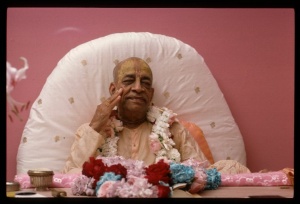SB 5.15.9: Difference between revisions
m (1 revision(s)) |
m (Text replacement - "==== <div class=" to "==== <div class=") |
||
| Line 1: | Line 1: | ||
{{info | {{info | ||
|speaker= | |speaker=Śukadeva Gosvāmī | ||
|listener=King | |listener=King Parīkṣit | ||
}} | }} | ||
[[Category:Srimad-Bhagavatam - Canto 05 Chapter 15|s09 ]] | |||
[[Category:Bhagavatam Verses Spoken by Sukadeva Gosvami - Vanisource|051509]] | |||
<div style="float:left">'''[[Srimad-Bhagavatam]] - [[SB 5|Fifth Canto]] - [[SB 5.15: The Glories of the Descendants of King Priyavrata|Chapter 15: The Glories of the Descendants of King Priyavrata]]'''</div> | |||
<div style="float:right">[[File:Go-previous.png|link=SB 5.15.8]] '''[[SB 5.15.8]] - [[SB 5.15.10]]''' [[File:Go-next.png|link=SB 5.15.10]]</div> | |||
{{RandomImage}} | |||
==== TEXT 9 ==== | ==== TEXT 9 ==== | ||
<div class="verse"> | |||
<div | :gayaṁ nṛpaḥ kaḥ pratiyāti karmabhir | ||
gayaṁ nṛpaḥ kaḥ pratiyāti karmabhir | :yajvābhimānī bahuvid dharma-goptā | ||
yajvābhimānī bahuvid dharma-goptā | :samāgata-śrīḥ sadasas-patiḥ satāṁ | ||
samāgata-śrīḥ sadasas-patiḥ satāṁ | :sat-sevako 'nyo bhagavat-kalām ṛte | ||
sat-sevako 'nyo bhagavat-kalām ṛte | |||
</div> | </div> | ||
| Line 17: | Line 22: | ||
==== SYNONYMS ==== | ==== SYNONYMS ==== | ||
<div class="synonyms"> | |||
<div | ''gayam''—King Gaya; ''nṛpaḥ''—king; ''kaḥ''—who; ''pratiyāti''—is a match for; ''karmabhiḥ''—by his execution of ritualistic ceremonies; ''yajvā''—who performed all sacrifices; ''abhimānī''—so widely respected all over the world; ''bahu-vit''—fully aware of the conclusion of Vedic literature; ''dharma-goptā''—protector of the occupational duties of everyone; ''samāgata-śrīḥ''—possessing all kinds of opulence; ''sadasaḥ-patiḥ satām''—the dean of the assembly of great persons; ''sat-sevakaḥ''—servant of the devotees; ''anyaḥ''—anyone else; ''bhagavat-kalām''—the plenary incarnation of the Supreme Personality of Godhead; ''ṛte''—besides. | ||
</div> | </div> | ||
| Line 25: | Line 29: | ||
==== TRANSLATION ==== | ==== TRANSLATION ==== | ||
<div class="translation"> | |||
<div | |||
The great King Gaya used to perform all kinds of Vedic rituals. He was highly intelligent and expert in studying all the Vedic literatures. He maintained the religious principles and possessed all kinds of opulence. He was a leader among gentlemen and a servant of the devotees. He was a totally qualified plenary expansion of the Supreme Personality of Godhead. Therefore who could equal him in the performance of gigantic ritualistic ceremonies? | The great King Gaya used to perform all kinds of Vedic rituals. He was highly intelligent and expert in studying all the Vedic literatures. He maintained the religious principles and possessed all kinds of opulence. He was a leader among gentlemen and a servant of the devotees. He was a totally qualified plenary expansion of the Supreme Personality of Godhead. Therefore who could equal him in the performance of gigantic ritualistic ceremonies? | ||
</div> | </div> | ||
__NOTOC__ | |||
<div style="float:right; clear:both;">[[File:Go-previous.png|link=SB 5.15.8]] '''[[SB 5.15.8]] - [[SB 5.15.10]]''' [[File:Go-next.png|link=SB 5.15.10]]</div> | |||
__NOTOC__ | |||
__NOEDITSECTION__ | |||
Revision as of 15:36, 14 November 2018

A.C. Bhaktivedanta Swami Prabhupada
TEXT 9
- gayaṁ nṛpaḥ kaḥ pratiyāti karmabhir
- yajvābhimānī bahuvid dharma-goptā
- samāgata-śrīḥ sadasas-patiḥ satāṁ
- sat-sevako 'nyo bhagavat-kalām ṛte
SYNONYMS
gayam—King Gaya; nṛpaḥ—king; kaḥ—who; pratiyāti—is a match for; karmabhiḥ—by his execution of ritualistic ceremonies; yajvā—who performed all sacrifices; abhimānī—so widely respected all over the world; bahu-vit—fully aware of the conclusion of Vedic literature; dharma-goptā—protector of the occupational duties of everyone; samāgata-śrīḥ—possessing all kinds of opulence; sadasaḥ-patiḥ satām—the dean of the assembly of great persons; sat-sevakaḥ—servant of the devotees; anyaḥ—anyone else; bhagavat-kalām—the plenary incarnation of the Supreme Personality of Godhead; ṛte—besides.
TRANSLATION
The great King Gaya used to perform all kinds of Vedic rituals. He was highly intelligent and expert in studying all the Vedic literatures. He maintained the religious principles and possessed all kinds of opulence. He was a leader among gentlemen and a servant of the devotees. He was a totally qualified plenary expansion of the Supreme Personality of Godhead. Therefore who could equal him in the performance of gigantic ritualistic ceremonies?